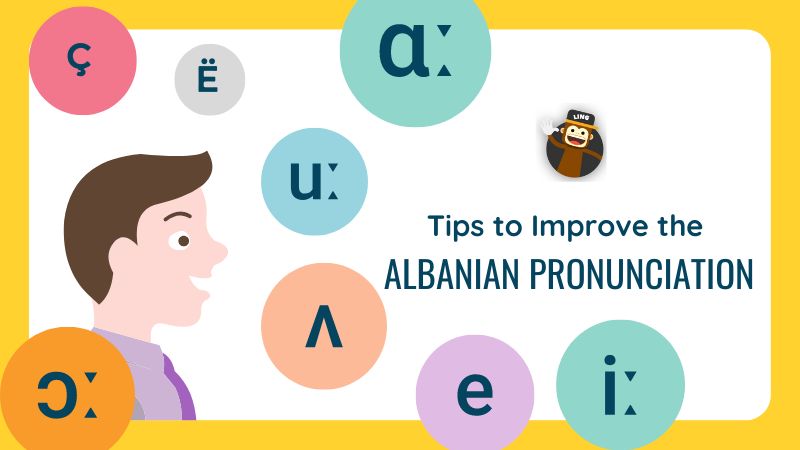Are you new to Albania or want to visit the land? Have you squared away your motivation for learning the Albanian language and considered your accent a hurdle in your Albanian language journey? Don’t be too hard on yourself. Don’t burn away your energy thinking about your foreign accent. If you want to speak Albanian like a native speaker and truly understand the Albanian culture, this article is your best guide. In this article, we will bring you awesome tips to improve Albanian pronunciation in no time. If you are ready for that, let’s dive into the sea of tips and tricks!!!
Albanian Language And Dialects
The Albanian language falls under the Indo- European group of languages. Still, it makes its very own branch as it does not fall under any other European language family though thought to belong to Balkan languages. This aspect makes it distinct and thus has different Albanian alphabets and other language structures.
Albanian is a popular language. It is the official language of Albania and is the native language or mother tongue of nearly ten million or more speakers worldwide. It has two main dialect groups, i.e., south, speaking Tosk and north-speaking Gheg.
Tosk is utilized in the region located in the south of the Shkumbin river, while the Gheg dialect is spoken in the north. Both dialects have significant similarities and thus will be treated as a single dialect.
The script is written in either the Greek, Cyrillic, or Arabic alphabet (Turkish version).
Albanian Alphabet
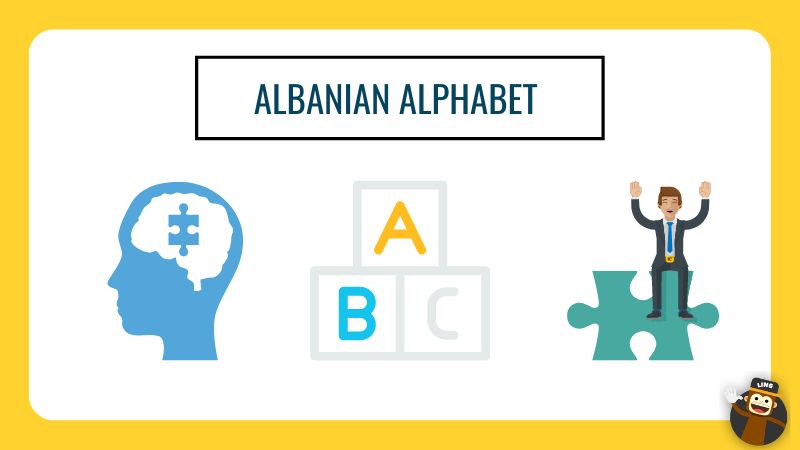
The modern Albanian language consists of twenty-nine consonants and seven vowels. It takes its letters from the Latin alphabet with the additions of ‘ç’ and ‘ë’ and digraphs.
Now you must be asking yourself, Is learning Albanian Hard? Learning and speaking Albanian as a foreign language is considered tricky because although one gets to know the Albanian vocabulary mostly cannot pronounce the alphabet properly.
The Albanian alphabet is different from other languages like Latin, English, German, etc., and therefore people often use the sounds in these languages to pronounce Albanian words. And let me give you a pro tip, it’s a big no in Albania.
Knowing the pronunciation of the letters is crucial to understanding and sounding like the locals. If you utter the sound wrong, you probably won’t be able to convey what you want to ask or say.
Pronunciation In Albanian
The Albanian language has different letters for different sounds, so one can say there is no confusion between the sounds of the letters. Considering this aspect, the language is relatively easy, with just a few letters more than in English and other European languages, while many sound like English speakers.
The total number of letters in Albanian is thirty-six and thus has that many Albanian sounds. Apart from those of English letters, there are digraphs, also known as compound letters, i.e. ‘dh’ and ‘th’, and strange letters, i.e., ‘ç’ and ‘ë’. ‘W’ is not present in Albanian.
Diagraphs Or Compound Letters
Compound letters are mostly marked as differences between Albanian and other languages like English, Latin, Spanish, German, etc.
What defines these compound letters is that all Albanian sounds cannot be represented through Latin alphabets. There are certain sounds in Albanian that are more like a compound sound, a mixture of two sounds in other European languages, which are termed compound letters.
Some compound letters, i.e., dh, gj, ll, nj, rr, sh, th, xh, and zh are treated as separate letters, each dedicated to a single sound, and thus cannot be categorized properly. For instance, “th” cannot come under the label t.
Dh sounds similar to (ð) as in ‘that’ in English. Gj (ɟ) has no equivalent sound in English but has a pronunciation closer to (j) as in ‘join’. It is a palatal sound as the tongue touches the palate when pronouncing this letter. It also sounds like the native English pronunciation of ‘d’ in during.
Let’s learn about others too.
- ‘Ll’ is a letter with more emphasis than ‘l’ and sounds more like (ɫ) as in ‘balloon’.
- ‘Nj’ sounds like (ɲ) as in ‘new’. ‘sh’ in English and Albania sounds the same, but it is not considered a separate letter, while in Albanian, it is treated as a particular letter, and it sounds like (ʃ) as in ‘sheep’.
- ‘Th’ sounds like ‘th’ in ‘think’. ‘Xh’ is related to (d͡ʒ) as in Jupiter. Zh is more similar to (ʒ) as in ‘measure’.
- ‘Rr’ is not a distinct sound in English and thus not any letter for the sound. Still, in Albanian, it sounds like (r) as in-furrow.
- ‘Ç’ and ‘ë’ are Albanian letters that are not there in English. Ç sounds like (t͡ʃ) as in bat, while ‘ë’ sounds similar to the sound ‘u’ as in purse.
Vowels
There are seven vowels in the Albanian language. Five are like in the English language, and some sounds are precisely how the native English speakers sound but have two more vowels.
- /a/ is a phoneme of the Albanian alphabet a and sounds like a sound in a car.
- /ɛ/ as e in let
- /i/ as I in the beach
- /ɔ/ as indoor
- /u/ as u in put.
Other than these five English vowel sounds and letters, there are two more vowels in Albanian
- /ə/ is written as ë and sounds like in a purse
- /y/ is pronounced as y, which has no specific relevance to English words. The phoneme of this letter starts with the ee sound as in jeep and then round your lips as if you are whistling.
Consonants
The Albanian language has twenty-nine consonant letters and thus consonant sounds. The phonemic presentation of these sounds with their closer pronunciation in the English language is as follows.
- B, (b) as in a bucket
- C (t͡s) as in cats
- D (d) as in dry
- F (f) as in flower
- G (ɡ) as in gate
- H (h) as in a hotel
- J (j) as in yellow
- K (q) as in keen
- L (l) as in lime
- M (m) as in mango
- N (n) as in number
- P (p) as in a pocket
- Q (c) has no English sound but sounds equivalent to ch as in future
- R (ɾ) as in red
- S (s) as in son
- T (t) as in the trunk
- V (v) as in van
- X (d͡z) as in adz
- Z (z) as in zebra.
Sources And Platforms
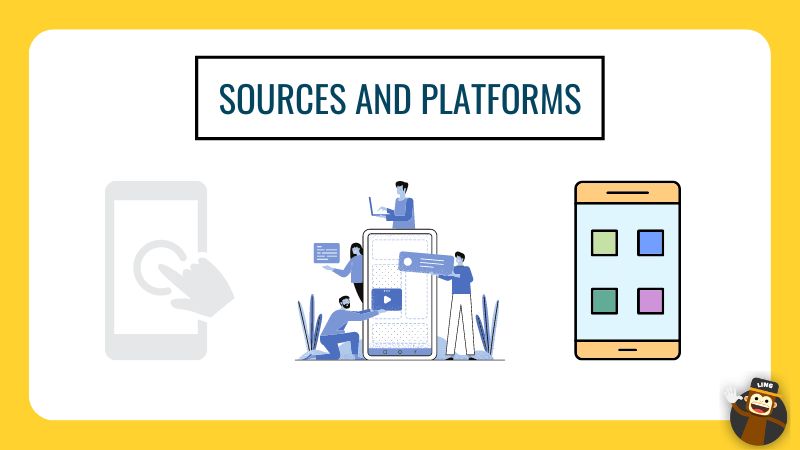
Learning Albanian could become easy for you if you follow a few different resources, as these play a crucial role in learning the language.
Knowing the phonemes and pronunciation of the Albanian letters is crucial to learning the language. If one has mastered the letters along with the basic Albanian vocabulary and their pronunciation, one can go for other tools, methods, or Albanian language resources mentioned below to improve the pronunciation.
Textbooks
Textbooks are the primary source of any language as these are comprised of the most basic lessons on some topics and subjects. The detailed description is given in the required language; thus, one has to read the only language in which they are written.
If one knows how to read Albanian, they can improve the pronunciation or the accent through this method. Most textbooks designed for some specific language contain workbooks and activity books with audio that the reader follows.
Thus, taking part in the activities by listening to the audio does the job, and one can improve pronunciation in no time.
Courses
Most courses are efficient for improving one’s pronunciation and accent in any language if offline and online courses are available. Still, in this advanced tech-based world, online courses are preferred as these save time and energy.
Some of the language courses like Albanian are paid. In contrast, some websites also offer free online courses, lessons, and activities in the Albanian language.
One of the best things about these courses is that one does not have to visit Albania to learn the language. Instead, you can learn it from the comfort of your couch without wasting time and money.
You will get to know from the native speaker who is the best source for the correct pronunciation. These courses can help you quickly improve your Albanian accent, which is otherwise considered a complex language to learn.
TV Shows
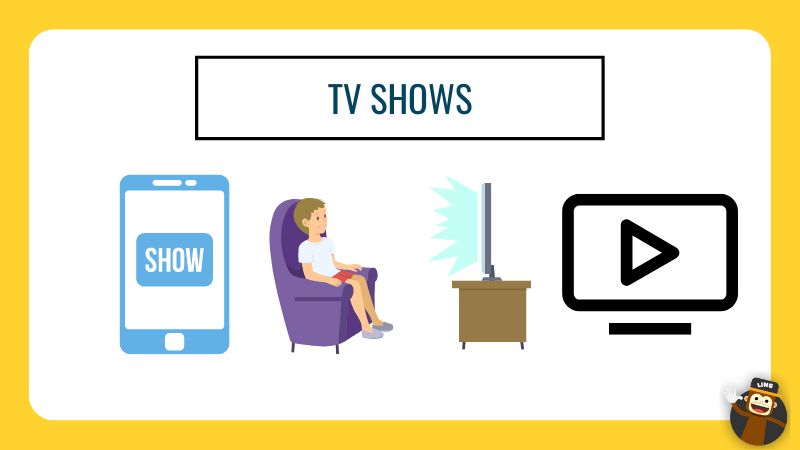
Tv shows are considered suitable for entertainment and information purposes. But these sometimes prove to be ideal for learning languages as well, especially their pronunciation.
As the TV shows display both the audio and video, one can get to know about the accents more effectively than just from the audio. The reason is that one can see the speaker speaking the words and get shown to move their mouth and lips to pronounce a particular word.
Movies
Movies can prove to be equally effective, just like TV shows, as one can quickly learn to pronounce words and phrases by seeing the movement of the lips of the actors. Some movies are subbed or dubbed, i.e. have subtitles or voice editing, which helps you understand the meaning also.
Some movies have the native language script, transliteration, and translation. Such films are one of the best ways to learn the pronunciation of a language while being entertained. Movies may also help understand the Albanian language, especially those with transliteration. You learn the best when you enjoy the process.
There are many apps out there providing Albanian TV shows and movies with subtitles. Vouch for those!
YouTube Channels
YouTube channels are still another way to learn languages. There are two types of channels from which you can learn any language, including Albanian, i.e., language channels which are meant to teach language while others are just about the random topic, but as those are recorded in local or native languages, they help enhance your pronunciation.
The channels meant for specific languages like Albanian are the best source to learn the pronunciation as the YouTubers pick one word, phrase, or sentence at a time and speak it slowly and repeatedly through which you know that word or phrase. They pronounce it in a way that one can quickly and effortlessly get to learn.
Tips Based On The Structure Of Albanian
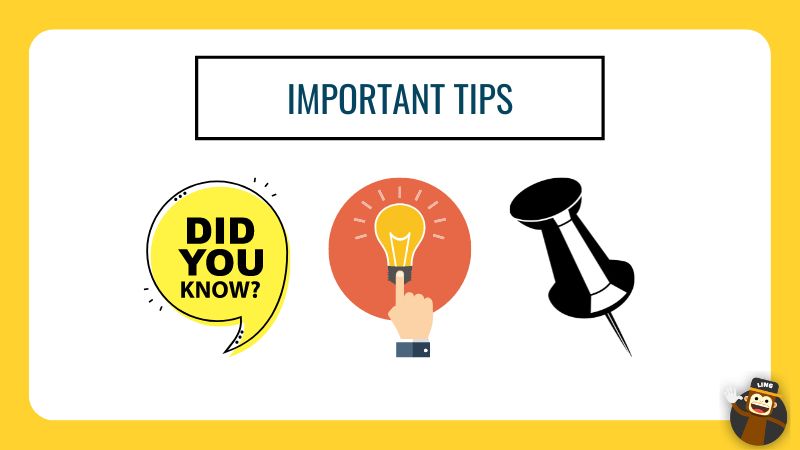
Learning a language by comparing it with other languages of the same family or closely related scripts can become a valuable way to learn pronunciation.
Albanian is closely related to English and Latin in many ways as it takes the text from Latin, while most of its letters are those of English with just a few exceptions. W
Let’s now talk about the structure, grammar, stress pattern, and pronunciation compared to those of the English language.
Pronunciation
The pronunciation of Albanian letters and sounds seems more manageable than English letters. Most of the letters in English and Albanian are the same, with just a few exceptions.
Albanian is easy because if you know English letters and sounds, you will be left with just a few sounds to memorize. Secondly, in the English language, one letter may stand for more than one sound like (i) can give the sound of /i/ as in ice as well as in a ship.
On the other hand, (i), i.e.,/i/ in Albanian, stands just for I in the seed. So, one can quickly memorize Albanian sounds and letters compared to English ones.
Stress Patterns
If we compare the stress pattern of both languages, Albanian looks more effortless and straightforward compared to English.
In English, stress is quite critical to learn as one might get confused about where to put the stress. In English, there are so many areas of stress/emphasis, like the first, second or last syllable, first or previous stem in compounds, and the word in the phrase.
On the other hand, the Albanian stress role is simple and easy as you have to stress the last syllable, last stem, and the last word, respectively.
For example, in English, the stress pattern varies even in a single word, e.g., in the word ‘rebel,’ the stress will be put on the first or the second syllable depending upon the context like it can be pronounced as REbel or reBEL. In contrast, in the case of Albanian, it will be pronounced as reBEL only.
See? The Albanian pronunciation is not that hard, I told you!
Grammar Structure
Moving on to the grammar structure, the general concept that Albanian grammar has a complex structure compared to the English language is far from the truth. Both languages have almost the same grammatical structures, just like the script.
Its grammatical structure is also quite close to other European languages (especially Balkan languages like Greek and Latin) because it shares its roots with those languages.
Thus if you are a native speaker of Balkan languages like Greek and Latin, you will get mastery of the Albanian language very quickly. Similarly, if you are a native speaker or even a second language speaker of the English language, you will learn Albanian quickly.
Working On Self Practices
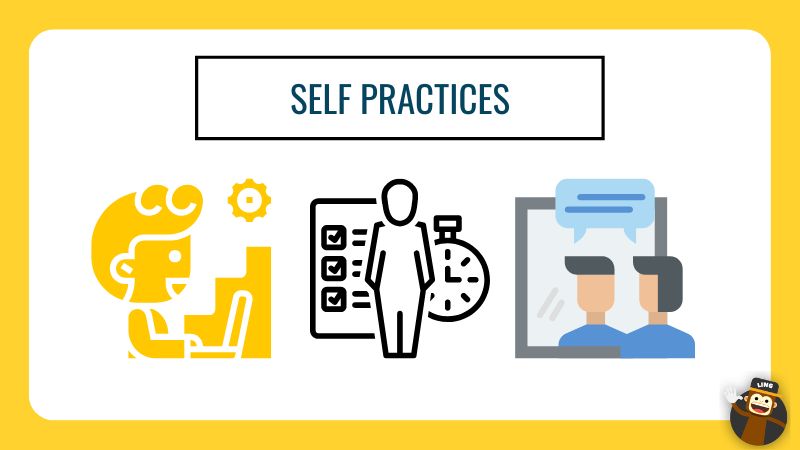
These practices are mostly related to your learning skills in your language acquisition. The most common are as follows.
Don’t Speak Too Fast
If you want to learn Albanian or any other new language, don’t speak too fast as you may miss some of the pronunciation patterns and other vital features, and slowly, you may lose the correct way of saying the word.
Secondly, it might also make others difficult to understand and lead to the perception that the person does not know the language. Think about the pronunciation and utter the words. Try relaxing and calming yourself down before speaking.
Listen And Observe
Be careful and attentive, and observe the times when you are engaged in a conversation. Try to listen and comprehend the pace and intonation of the native speakers. If you have any problem pronouncing any word with a native accent, try repeating the word in your head again and again until you get it correctly.
Record Yourself
It can prove to be another way of improving your accent and pronunciation. Audio or video record yourself and listen to the recording to see if your accent and pronunciation are correct or not.
Read from a newspaper or any book and repeat and record what you have read. You can also record the pre-recorded speech in Albanian and match your pronunciation with the one in the address. You can correct yourself accordingly.
Do Exercises
When you are up to learning a new language that is not your native language, you sometimes find yourself stuck and confused with many words and phrases (especially the pronunciation). Doing some exercises proves to be a better choice in such situations.
Your mouth gets more training on pronouncing and producing some sounds, so learning newer sounds and words needs practice. It’s an excellent workout for your muscles to utter them correctly.
Look Words Up
Looking up words is still another way of learning the proper pronunciation of any language; the same is the case with Albanian.
If you want to master the pronunciation of Albanian in a shorter period, look for some common expressions, basic phrases, and new words like greetings and other sentences relating to your professions or matters that you might get involved in, like shopping vocabulary and cooking utensils words, etc.
Wrapping Up
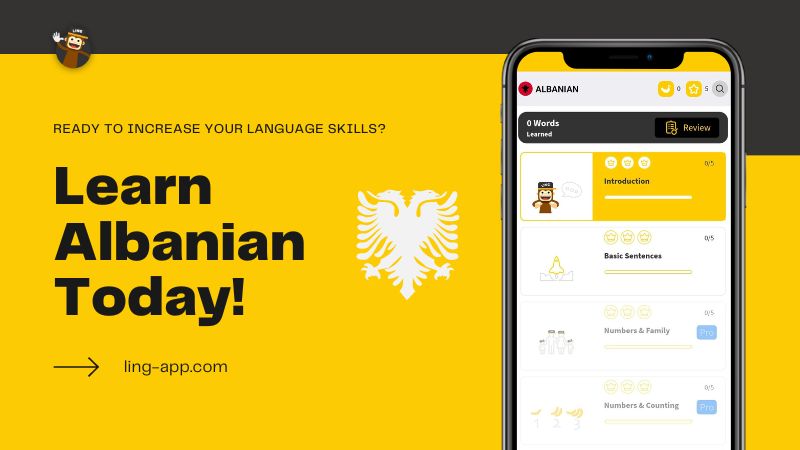
Learning a language is tricky as you have to start something from scratch. Foreign language learning takes much more than learning the vocabulary and the rules. Albanian pronunciation can be tricky if you aren’t aware of how to improve your Albanian pronunciation.
Different ways to improve your pronunciation of the Albanian language are learning about the best platforms, phonemic know-how, grammar rules, comparison with some easier or known languages like English, and some practice-based exercises.
All these ways provide you with more accessible solutions to learning Albanian and solving the other language pronunciation issues.
After bombarding you with so much information, I would also like you to know that these tricky concepts, which you might come across, have been made easy-peasy on the Ling App. Ling App is the perfect app you are looking for because of its versatility.
The diverse, unique, and proven ways of teaching Albanian on the Ling App will keep you on the app for longer. So download the Ling App from Google Playstore or App Store and start learning the Albanian language like a pro!
